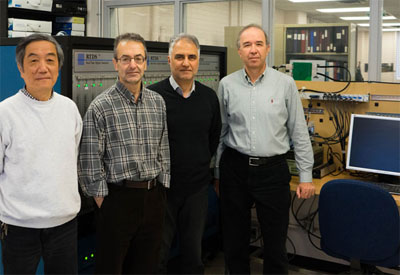Reducing ‘Range Anxiety’ for Electric Vehicles by Speeding Up Charging Time

January 4, 2018
Range anxiety — the fear that an electric vehicle’s charge will deplete before reaching its destination — has long been cited as a reason consumers are reluctant to embrace electric vehicles (EVs). This anxiety is compounded by the fact that EVs usually take much longer to charge than it takes to fill up a tank of gasoline on a traditional vehicle, prohibiting long distance travel for EVs, especially to areas without charging infrastructure along the way.
Professor Reza Iravani in The Edward S. Rogers Sr. Department of Electrical & Computer Engineering (ECE) is partnering with energy storage company, eCAMION, to quell range anxiety among prospective and current electric vehicle drivers — by enabling fast charging of electric vehicles.
“The existing Level-1 and Level-2 chargers take hours to charge EVs,” says Professor Iravani. “Level-1 and Level-2 chargers are impractical for long distance trips where you would want to charge your vehicle quickly and get back on the road, so what we are proposing in collaboration with eCAMION is the development of Level-3: fast charging infrastructure that would charge a car in about ten minutes.”
The key challenge for Level-3 EV charging is the limitations of the existing power grid infrastructure. Fast charging requires a large amount of energy in a very short time and the legacy power grid was not designed for this. “To upgrade the utility grid to provide this capability is extremely expensive, so the idea here is to have large-scale, utility-grade battery systems to charge EVs,” says Iravani. “Drivers would charge their EVs from these large batteries — think of them like gas stations — in about several minutes, and these stationary batteries would be gradually charged from the grid, based on the existing grid capacity.”
This project received funding through the TargetGHG program, funded by Ontario’s Ministry of Research, Innovation and Science (MRIS) and administered by Ontario Centres of Excellence (OCE), and through the Natural Sciences and Engineering Research Council of Canada (NSERC) as well as from eCAMION, totalling $2.4M over three years.
“Taking steps to reduce the impacts of greenhouse gases and air pollution on our climate and environment is a key priority in Canada,” says Dr. Marc Fortin, Vice-President, Research Partnerships, Natural Sciences and Engineering Research Council of Canada. “NSERC is proud to partner with Ontario Centres of Excellence to connect Canada’s top researchers and companies to develop innovative clean technologies that will advance environmental sustainability in Canada and improve the health and quality of life of Canadians.”
The TargetGHG program supports industry-academic collaborations that will help the province meet more aggressive future GHG targets.
“Supporting the efforts of large industries in their quest to reduce their greenhouse gas emissions is an important part of our government’s Climate Change Action Plan,” says Reza Moridi, minister of research, innovation and science. “With the help of our province’s innovative clean-tech companies, the TargetGHG program will help build a prosperous, low carbon economy and create a cleaner, more sustainable future for Ontario.”
Iravani’s research group will develop the overall control system for the EV battery charging station: providing charge for the EVs and the coordination among charging units, battery storage, and utility grid so as not to impose stress on the grid infrastructure. They will also develop the power electronics for the fast chargers: “The charger is a power electronic convertor system that provides the charge from the battery to the EV in a controlled manner,” says Iravani. “A charger unit that meets the requirements for the envisioned power and voltage levels does not exist in the market and its development is part of the project.”
Iravani expects to see at least one prototype installed within the first year of the project and the project will eventually have multiple installations along the TransCanada Highway across Ontario that could each charge multiple EVs at one time.
“Decreasing the time to charge an electric vehicle will also decrease range anxiety for consumers,” says Iravani. “If an EV could be charged in minutes instead of hours, we could see an uptake in the adoption of EVs — which would help to reduce greenhouse gas emissions and meet more aggressive reduction targets.”
Source: http://news.engineering.utoronto.ca/reducing-range-anxiety-electric-vehicles-speeding-charging-time/











![Guide to the Canadian Electrical Code, Part 1[i], 26th Edition– A Road Map: Section 56](https://electricalindustry.ca/wp-content/uploads/2022/11/Guide-CE-Code-2.png)



